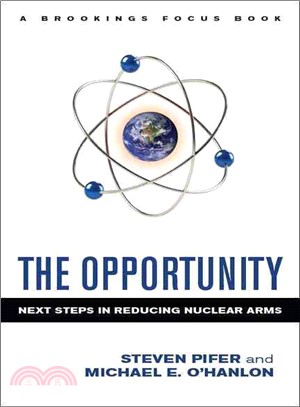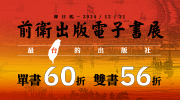The Opportunity ─ Next Steps in Reducing Nuclear Arms
商品資訊
系列名:Brookings FOCUS Books
ISBN13:9780815724292
出版社:Brookings Inst Pr
作者:Steven Pifer; Michael E. O'Hanlon
出版日:2012/11/01
裝訂/頁數:精裝/160頁
規格:21.6cm*14.6cm*2.5cm (高/寬/厚)
商品簡介
For some observers, nuclear arms control is either a relic of the cold war, or autopian dream about a denuclearized planet decades in the future. But in fact,as Brookings scholars Steven Pifer and Michael O'Hanlon argue in a new book,it is of major relevance to some of the key and urgent security challenges of the day.
Iran, North Korea, and Pakistan dominate the nuclear headlines, and policymakersconstantly try to find the right mix of sanctions, incentives, arms control options, andin some cases, even threats of military force to address the problems. Efforts led bythe Obama administration to pressure Iran not to enrich uranium, North Korea not totest more devices, or Pakistan to slow its arms racing depend on international consensusabout nuclear nonproliferation, nuclear testing, and nuclear weapons reductions.
Then there is Russia. It remains America's chief partner on nuclear arms negotiations,and also a rival in other ways. The Obama administration has had somesuccess in improving U.S.-Russian relations by returning to classic arms control,including the New START Treaty. Those improved relations in turn made it easier toget Moscow to pressure Iran over its nuclear program (and to supply NATO forcesin Afghanistan through the so-called Northern Distribution Network rather thanjust Pakistan). But U.S.-Russian relations remain complex, Moscow is opposed toAmerican plans for missile defense in Europe, and it is not clear how eager Russia isfor any further nuclear arms cuts given its reliance on weapons of mass destructionto protect its long borders.
What is the future of nuclear arms control for the next American president, be ita reelected Barack Obama or a newly elected Mitt Romney? Can there be anothermajor U.S.-Russia arms treaty? Can all the tactical and surplus warheads that haveso far escaped controls be brought into such a framework? Can a modus vivendibe reached between the two states on missile defense? And what of multilateralaccords on nuclear testing and production of fissile materials for nuclear weapons?Pifer and O'Hanlon concisely frame the issues, the circumstances, and the choicesfor a future president and offer their own recommendations as well.
作者簡介
Steven Pifer is a senior fellow in Foreign Policy studies and the Center on the UnitedStates and Europe at the Brookings Institution, where he directs the Brookings Arms Control Initiative. His long diplomatic career included considerable work on nuclear arms reductions and three years as U.S. ambassador to Ukraine.
Michael E. O'Hanlon is a senior fellow with the 21st Century Defense Initiative anddirector of research for Foreign Policy at Brookings, where he holds the Sydney SteinJr. Chair in International Security. His many books include Bending History: The ForeignPolicy of Barack Obama, with Martin Indyk and Kenneth Lieberthal (Brookings, 2012).
主題書展
更多書展今日66折
您曾經瀏覽過的商品
購物須知
外文書商品之書封,為出版社提供之樣本。實際出貨商品,以出版社所提供之現有版本為主。部份書籍,因出版社供應狀況特殊,匯率將依實際狀況做調整。
無庫存之商品,在您完成訂單程序之後,將以空運的方式為你下單調貨。為了縮短等待的時間,建議您將外文書與其他商品分開下單,以獲得最快的取貨速度,平均調貨時間為1~2個月。
為了保護您的權益,「三民網路書店」提供會員七日商品鑑賞期(收到商品為起始日)。
若要辦理退貨,請在商品鑑賞期內寄回,且商品必須是全新狀態與完整包裝(商品、附件、發票、隨貨贈品等)否則恕不接受退貨。
























